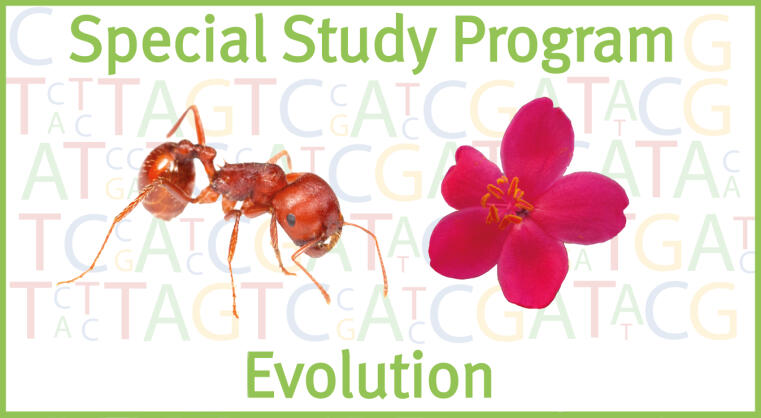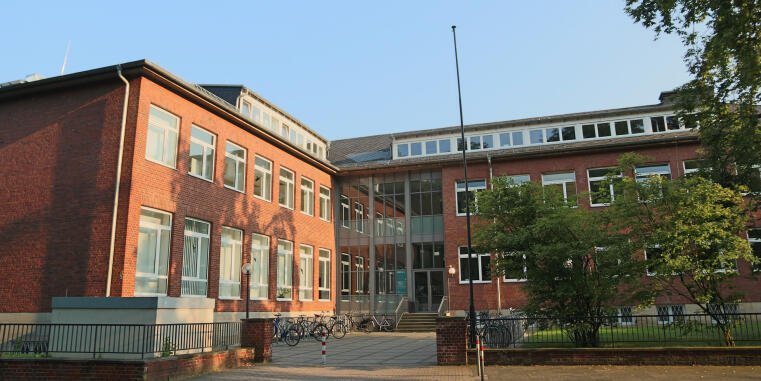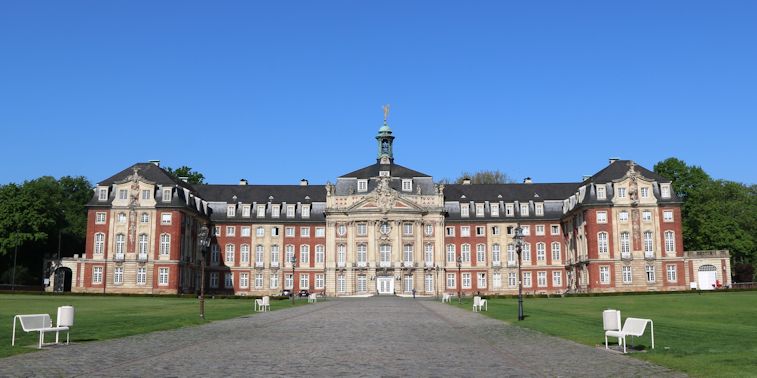
Special Study Program (SSP) in Evolution

Why study Evolution?
Life on earth is amazingly diverse and organisms, molecular networks and ecosystems have a most impressing complexity. This diversity and complexity in form and function has originated by two extremely simple processes: variation and selection. They are the two cornerstones of evolution, the central theory of biology.
Consequently, a thorough understanding of biology as a whole, as well as an analysis of diversity and complexity, depends upon knowledge and apprehension of the underlying evolutionary processes. For example, many key techniques in biotechnology utilize evolutionary 'tricks' such as viral infections, vectors or transposons for genetic manipulation that are important drivers of molecular evolution in the wild. In biomedicine, rapid evolution of viral or bacterial pathogens is 'evolution in action', requiring evolutionary thinking when devising defense strategies. In taxonomy and biodiversity research, the phylogenetic relatedness of microbes, animals and plants can now be reconstructed with ever increasing accuracy due to the rapid accumulation of genomic data; environmental management and the control of effects from global changes such as global warming will only be successful if environmental changes are also seen as novel selection pressures. In invasion biology, bottlenecks and hybridization after repeated introductions are key evolutionary processes that determine the 'success' (and damage) caused by invading populations.
Because Evolution is the core theory of Biology, we foresee a growing demand of scientists across disciplines that have a strong background in this field. Since in particular in Germany, Evolutionary Biology has been neglected over the last decades, our initiative at the University of Münster aims to fill this gap. We hope to attract students who are keen on advancing their knowledge on all aspects of Evolutionary Biology, from microbes to ecosystems, from the primordial soup to human populations, and from biopolymers to polar bears.General information on the Master Program in Biosciences
The "Special Study Program (SSP) in Evolution" is a specialization within our existing MSc in Biosciences (read here for further details on the MSc). The program has begun in October 2006. The first year of the MSc program consists of six advanced modules ("Fortgeschrittenen-Modul", 5 credit points each) and two research modules ("Forschungs-Modul", 10 credits each). The advanced lecture-based modules also include seminars, computer exercise and practical course work. Please refer to the module descriptions for more details. The research modules are short-term projects lasting 6 - 8 weeks and may consist of laboratory, field or theoretical work as necessary to the research question. These are conducted on an individual basis. Up to 10 credits in advanced or research modules may be achieved externally (for Münster students: check the Studienordnung). Students should consider taking research modules in other biology departments, either in Germany or abroad. Before deciding for an external module, students should consult their mentor who will help them choose the appropriate modules.
Specific information on the SSP in Evolution
Students who wish to follow the SSP in Evolution need to select modules from the SSP list. Those students who successfully complete the SSP will be awarded the degree ‘MSc in Biosciences‘ including a specification of the SSP work in their diploma supplement.
Students who want to participate in the SSP in Evolution must choose at least two Advanced Modules plus one Research Module (alternatively two Research Modules) from a set of designated courses in Evolutionary Biology. In any case, the Advanced Module ‚Concepts and current topics in evolutionary biology‘ is mandatory for this SSP (In case this means extraordinary hardship for your planned course of study, please contact the SSP coordinator Maik Bartelheimer to discuss possible solutions). Currently, this set consists of the modules offered at the University of Münster for which you can find short module descriptions below. These modules represent a subset from the modules outlined in the Bioscience Modulhandbuch. As mentioned above, students will have the option to choose up to a total of 10 credit points from the courses in another cooperating university.
All students should note that
- All modules are open for all students from the MSc Biosciences, MSc Biotechnology & MSc Molecular Biomedicine program without any but the usual restrictions ("Dozentenplatzvergabe")
- Students from all curricula are welcome to attend these advanced modules even if they are not planning to obtain the SPP "Evolution" certificate.
Eine Kurzbeschreibung in Deutsch
Das Spezialprogramm (= special study program) "Evolution" ist eine Spezialisierung innerhalb des Master-Studienganges Biologie. Studierende, die erfolgreich an diesem Spezialprogramm teilgenommen haben, erhalten einen Zusatz auf ihrem Master-Zeugnis-Supplement. Um an dieser Spezialisierung teilnehmen zu können, müssen im ersten Jahr des Masterprogramms mindestens 2 der angebotenen Fortgeschrittenenmodule plus eines der angebotenen Forschungsmodule (alternativ 2 Forschungsmodule) im Bereich Evolutionsbiologie angewählt werden. In allen Fällen ist das Fortgeschrittenenmodul "Concepts and current topics in evolutionary biology" verpflichtend für dieses SSP. Bis zu 10 Kreditpunkte können auch extern absolviert werden (falls dies zu außerordentlichen Schwierigkeiten in Ihrem Studienverlauf führt, kontaktieren Sie bitte den SSP Koordinator Maik Bartelheimer, um mögliche Lösungen zu erörtern).Bevor Studierende sich entscheiden, an dem Spezialisierungsprogramm teilzunehmen, ist eine Rücksprache mit dem jeweiligen Mentor und/ oder dem Koordinator des SSP, Dr. M. Bartelheimer, empfohlen. Kurse werden auf Englisch durchgeführt, um den innereuropäischen Austausch von Studierenden zu stärken.
How to apply for the SSP in Evolution
Please announce your interest to the SSP advisor Dr. Maik Bartelheimeras early as possible, preferrably a couple of weeks before enrolling the first courses, to check elegibility.
For more information on how to plan your studies and get credits, please contact the advisor Dr. Maik Bartelheimer.
Advanced Modules
WINTER (WiSe):
Block II III IV All Semester Module Concepts and current topics in evolution Molecular Phylogenetics Biocomputing 1
Biocomputing 2
The Growth of the Evolutionary Thought Host-Parasite Coevolution
SUMMER (SoSe):Block I II III out of term Module Advanced Statistical Methods for Biological Data Analysis Evolutionary Protein Engineering Experimental Ecology
Biodiversity of Inland Waters Computational analysis of transcriptomes and proteomes
Mediterranean Fauna Detailed information about the contents of the advanced modules can be found here. For organizational information of the related courses, please refer to the Modulhandbuch.
Research Modules
The Research Modules are small projects lasting 6-8 weeks and are carried out in a research group under supervision of a senior researcher, post-doc, or professor. Students are expected to follow one Research Module in each of the two semesters during the first year of the MSc curriculum. To count for the SSP, one or two research modules would be taken in a group of the IEB (also compare the „General Information“ above).
Currently, the IEB offers the following research modules:
- Biological data analysis
- Ecological immunology and host-parasite coevolution
- Insect Evolutionary genomics
- Evolutionary Genomics in parasitoids and social insects (ants)
- Experimental aquatic ecology
- Proximate and ultmate mechanisms of social evolution in social Hymenoptera
- Plant Biodiversity and Molecular Evolution
- Evolutionary Genomics of Non-model Plants II
In order to apply for a research module, please contact the respective group leader.
Taking courses elsewhere
Up to 10 credits in advanced or research modules can also be taken elsewhere. Students must contact their mentor before deciding on external modules and discuss their choice. Before that make sure that the credit points are equivalent, that there are not overlaps with other courses and the contents is a reasonable complement to the other courses. One possibility would be the Ludwig Maximilians University in Munich.
Mind the prize!
Up to three students from each SSP cohort will be awarded the Annual Bernhard-Rensch Prize in Evolution for the best SSP thesis. The prize is endowed with a total of 400 EUR.
Past winners of the prize:
- 2009: Lothar Wissler
- 2010: not awarded
- 2011: Shirin Glander
- 2012: Ann-Kathrin Huylmanns
- 2016: Jonathan Schmitz
- 2017: Lukas Kremer
- 2018: not awarded
- 2019: not awarded
- 2020: not awarded
- 2021: not awarded
- 2023: Marie Lebherz
- 2024: not awarded
Getting Started
Since places may be limited in some of the modules and each module can also be chosen from students who are not on the SSP, we recommend all students who wish to participate in the SSP to contact us early (see below), to let us know that you are interested. To guarantee places in all selected modules, students should contact us before the choice of modules on the MSc is put online, typically this would be June/July (since the MSc course starts in October).
About the IEB (Institute for Evolution & Biodiversity)
The School of Biological Sciences (FB 13) at the University of Münster has built a tradition of excellence in evolutionary research and teaching. Bernhard Rensch, one of the key contributors to the modern synthesis, directed the Institute of Zoology for many years and helped establish the University as a centre for evolutionary study. In 2006, the School was one of three German Universities to be awarded a grant from the Volkswagen Foundation and this award provided funding for this curriculum.
The following groups are currently conducting research in the field of evolution and biodiversity at the IEB:
- Animal Evolutionary Ecology (Prof. Kurtz)
- Evolution & Biodiversity of Plants (Prof. Müller)
- Limnology (Prof. Meyer)
- Molecular Evolution & Bioinformatics (Prof. Bornberg-Bauer)
- Molecular Evolution & Sociobiology (Prof. Gadau)

© IEB About Münster
Münster hosts many excellent scientific institutions such as a Max-Planck Institute for Biomedical Research, a Centre for Nanotechnology and a great number of specialised research areas ("SFBs"). Münster is a dynamic city with a world-famous heritage centre and in the middle of the beautiful "Münsterland''. It is very lively with many students (around 20% of the residents) and scholars. In addition, there is a rich choice of social and cultural activities and excellent sporting facilities (see muenster.de or Münster Marketing for further details).

Contact
- Secretary (for general information): evolecol@uni-muenster.de
- Advisor for the SSP: Dr. Maik Bartelheimer

